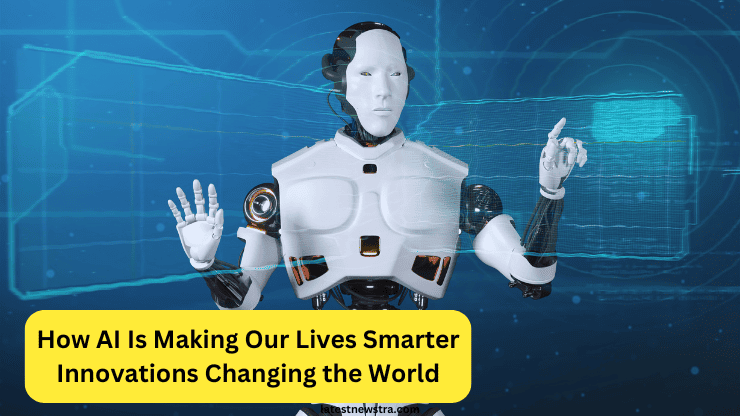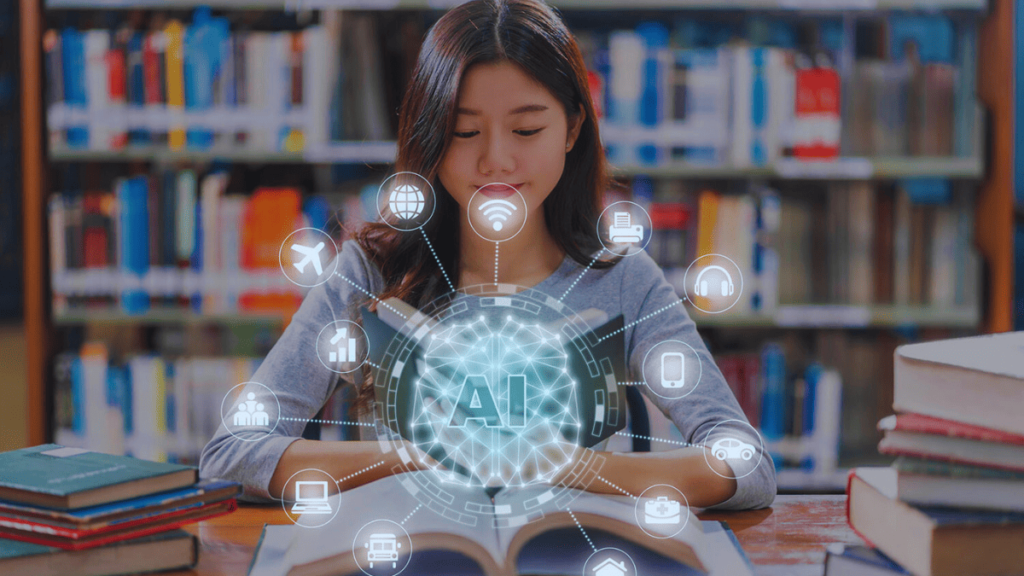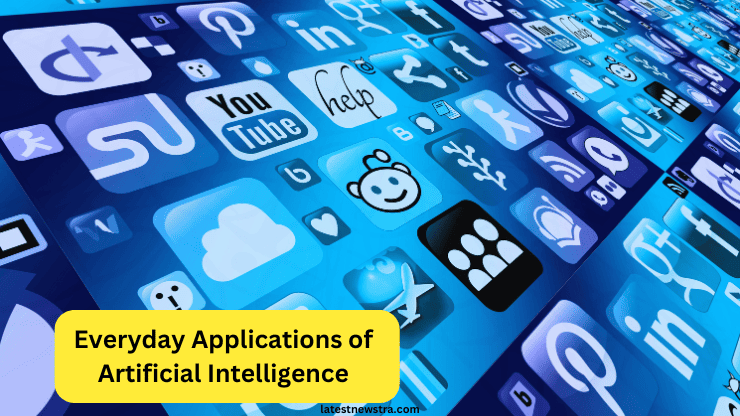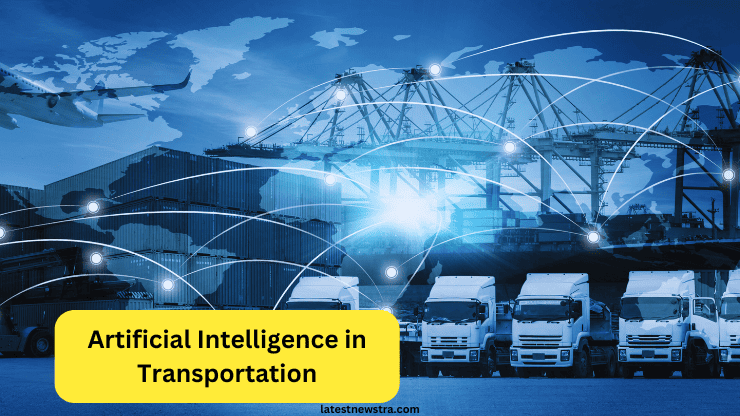Artificial Intelligence (AI) is no longer a futuristic concept confined to science fiction; it has become an integral part of our daily lives, revolutionizing how we live, work, and interact with the world. Whether it’s the ease of unlocking your smartphone using facial recognition or receiving precise recommendations for movies, music, and shopping, AI has seamlessly woven itself into the fabric of modern life.

But what makes AI so transformative? The secret lies in its ability to analyze vast amounts of data, recognize patterns, and learn from experience, enabling it to perform tasks that traditionally required human intelligence. This article explores the groundbreaking innovations driven by AI and how they are making our lives smarter and more efficient.
Understanding Artificial Intelligence
Definition of Artificial Intelligence
Artificial Intelligence, often abbreviated as AI, refers to the simulation of human intelligence in machines programmed to think, learn, and make decisions. Unlike traditional software, which follows a fixed set of instructions, AI adapts and evolves through experience, making it incredibly versatile and powerful. For example, an AI system used in medical diagnostics can learn to detect diseases more accurately as it processes more data over time. This adaptability is what sets AI apart, allowing it to tackle complex problems with remarkable efficiency.
A Brief History of AI

The concept of AI has been around for decades, with its roots tracing back to the 1950s when computer scientist Alan Turing posed the question, “Can machines think?” This led to the creation of the first AI programs, which were basic and primitive compared to the advanced systems we see today Fast forward to the 21st century; AI has grown into a sophisticated field, supported by advancements in computing power, data storage, and algorithm design. From IBM’s Deep Blue defeating world chess champion Garry Kasparov in 1997 to today’s AI-powered virtual assistants, the journey of AI has been nothing short of remarkable.
How Artificial Intelligence Works
Machine Learning
At the heart of AI lies machine learning (ML), a subset that focuses on enabling systems to learn from data and improve performance without explicit programming. Imagine teaching a child to recognize animals by showing them pictures repeatedly; machine learning works similarly. By feeding data into algorithms, the system learns to identify patterns, classify objects, or even predict future outcomes. This technology powers everything from spam filters in emails to complex financial models.
Neural Networks
Neural networks, which are modeled after the structure of the human brain, are another fundamental component of AI. These systems consist of interconnected nodes (like neurons) that process and analyze data in layers. Neural networks are particularly effective for tasks like image recognition, speech synthesis, and natural language processing, enabling applications such as facial recognition and voice-to-text conversion.
Everyday Applications of Artificial Intelligence
Artificial Intelligence in Smartphones
Your smartphone is a hub of AI innovation. Features like predictive text, voice-to-text transcription, and intelligent photo enhancements are powered by AI algorithms working behind the scenes. For instance, when your phone’s camera suggests the best settings for a photo, it’s using AI to analyze lighting, focus, and composition.

Virtual Assistants
Voice-activated virtual assistants like Siri, Alexa, and Google Assistant have transformed how we interact with technology. These AI-driven tools can perform a range of tasks, from setting reminders and playing music to controlling smart home devices. Their ability to understand natural language makes them indispensable companions in our busy lives.
Artificial Intelligence in Social Media
Personalized Feeds
Ever wondered why your social media feed seems tailored to your interests? AI algorithms analyze your behavior—likes, shares, and interactions—to curate content that aligns with your preferences. This ensures you spend more time engaging with posts that resonate with you.
Content Moderation
Social media platforms rely on AI to identify and remove inappropriate or harmful content, ensuring a safer online environment. By analyzing text, images, and videos, AI systems can detect hate speech, misinformation, and graphic content with impressive accuracy.
Artificial Intelligence in Healthcare

Diagnosis and Treatment Plans
AI is revolutionizing healthcare by enhancing the accuracy and speed of diagnosis. For instance, AI-powered systems can analyze medical images, such as X-rays and MRIs, to detect conditions like cancer at an early stage. This not only saves time but also improves patient outcomes by enabling timely treatment.
Role of AI in Drug Discovery
The process of discovering new drugs is notoriously time-consuming and expensive. AI accelerates this by analyzing biological data and identifying potential drug candidates much faster than traditional methods. This innovation is paving the way for breakthroughs in treating diseases that were previously deemed incurable.
AI in Patient Monitoring Systems
Wearable devices equipped with AI, such as smartwatches, monitor vital signs like heart rate, oxygen levels, and sleep patterns. These devices can alert healthcare providers to abnormalities, ensuring proactive care and reducing hospital visits.
AI Revolutionizing Industries
Artificial Intelligence in Finance
Fraud Detection
AI systems analyze transactional data in real time to detect unusual patterns indicative of fraud. By identifying discrepancies and flagging suspicious activity, these systems provide an additional layer of security for financial institutions and customers alike.
Personalized Banking
AI is reshaping the banking experience by offering personalized financial advice and services. Chatbots powered by AI assist customers with account inquiries, loan applications, and investment advice, providing 24/7 support.
Artificial Intelligence in Transportation

Autonomous Vehicles
Advancements in AI have made self-driving cars a reality. These vehicles rely on sensors, cameras, and complex algorithms to navigate roads, avoid obstacles, and prioritize passenger safety. Leading companies such as Tesla and Waymo are at the forefront of turning autonomous vehicles into everyday technology.
Traffic Management
AI is essential in improving and managing traffic flow efficiently. By analyzing data from traffic cameras and sensors, AI systems can predict congestion and adjust signal timings, reducing commute times and fuel consumption.
Artificial Intelligence in Retail and E-commerce

Personalized Shopping Experiences
Online retailers use AI to recommend products based on your browsing history and preferences. This not only enhances customer satisfaction but also drives sales by offering a tailored shopping experience.
AI and Education
Personalized Learning Platforms
AI-driven learning platforms adapt to each student’s unique needs, offering customized lesson plans, quizzes, and feedback. This ensures students can learn at their own pace, making education more inclusive and effective.
AI Tutors and Virtual Classrooms
Virtual classrooms powered by AI are bridging the gap between students and educators, especially in remote or underserved areas. AI tutors provide real-time assistance, helping students grasp complex concepts with ease.
The Future of Artificial Intelligence
Smart Cities
AI is at the forefront of building smart cities, where technology integrates seamlessly with urban living. From intelligent traffic systems to energy-efficient buildings, AI is making cities more sustainable and livable.
AI and Sustainability
AI is helping combat climate change by analyzing environmental data and proposing actionable solutions. For example, AI-powered systems can optimize energy usage, monitor deforestation, and predict weather patterns, contributing to a greener planet.
Ethical Concerns and Challenges
As AI becomes more pervasive, ethical questions around data privacy, algorithmic bias, and job displacement come to the forefront. Addressing these challenges is essential to ensure AI serves humanity responsibly.
Conclusion
Artificial intelligence is undeniably reshaping our world, making it smarter, more efficient, and more connected. From revolutionizing healthcare and education to enhancing daily conveniences, its impact is far-reaching. However, as we embrace these advancements, it’s crucial to navigate the ethical challenges and ensure AI remains a force for good. The journey of AI has just begun, and its potential to drive innovation and solve global challenges is limitless.
What is the most common application of AI in daily life?
Virtual assistants and personalized content recommendations are the most widely used AI applications.
How is AI improving healthcare?
AI enhances healthcare by aiding in early disease detection, patient monitoring, and accelerating drug discovery.
Can AI completely replace human jobs?
While AI can automate repetitive tasks, it also creates new opportunities requiring human creativity and decision-making.
What are some ethical challenges with AI?
Ethical concerns include data privacy issues, bias in algorithms, and potential job displacement due to automation.
